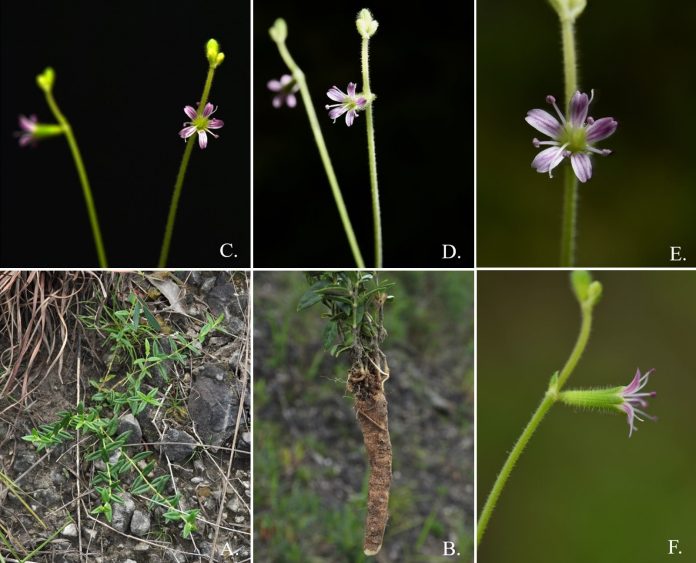The new record of Psammosilene tunicoides W.C.Wu & C.Y.Wu was discovered on a degraded calcareous substrate mountain in the western part of Thailand near the Thai-Myanmar border. The species was previously reported to be endemic to South-west China.
The genus Psammosilene, first described in 1945 (Wu & Wu, 1945). It is in the family Caryophyllaceae in the major group Angiosperms (Flowering plants). Psammosilene is a monotypic genus distributed in temperate montane regions in south-west China. The genus has a close relationship with Dianthus L., KohlrauschiaKunth, Petrorhagia (Ser.) Link and Velezia L. in the subfamily Caryophylloideae according to seed morphology, but also stated that the genus is insufficiently known and needs further study. An account of the family Caryophyllaceae in Thailand was revised by Phuphathanaphong (1992) with eight genera recognised but did not record Psammosilene in the account. The genus is characterised by the long conical subfleshy root, several prostrate stems, subsessile leaves, glandular and tubular-campanulate, and 15-veined calyx tube, spathulate petals, and the two styles. There are two genera in Thailand that have sepals connate, Silene L. and Vaccaria Wolf, but these genera otherwise have quite different morphologies compared to Psammosilene.
This new record of Psammosilene tunicoides W.C.Wu & C.Y.Wu was discovered by Omran Suddee and his research team during their plant collecting trip to Doi Hua Mot, a unique ‘Bald-Headed’ degraded calcareous substrate mountain in Umphang District, Tak Province, the western part of Thailand. Several new species have been reported from this botanically unique area which is mostly covered with short grasses and herbs
Psammosilene tunicoides W.C.Wu & C.Y.Wu has been widely used as a medicinal plant in China to check bleeding, relieve pain and promote blood circulation, and has also been used as an important ingredient in some well-known Chinese traditional medicine formulations.
Long-term uncontrolled exploitation has caused a reduction in geographic range and population size of P. tunicoides and now the species is at great risk of extinction: the species was listed in the China Plant Red Data Book as rare and endangered. The discovery in Thailand means that the species is not as narrowly distributed as once thought which could be good news for its long-term survival.
If you are interested to read more on this research, you can find the full research article in here
Cover Photo – by W. Kiewbang; T. Phutthai and N. Tetsana.

























